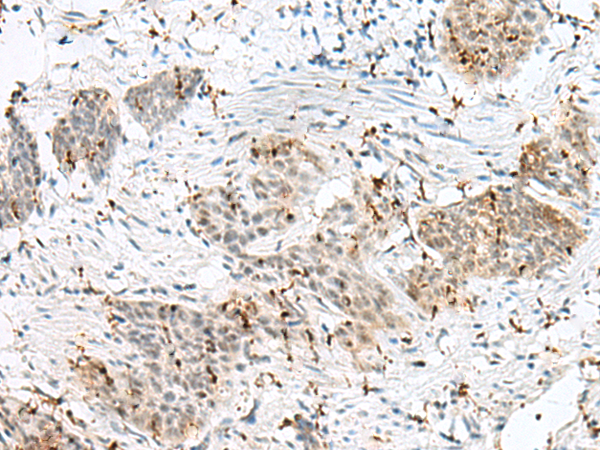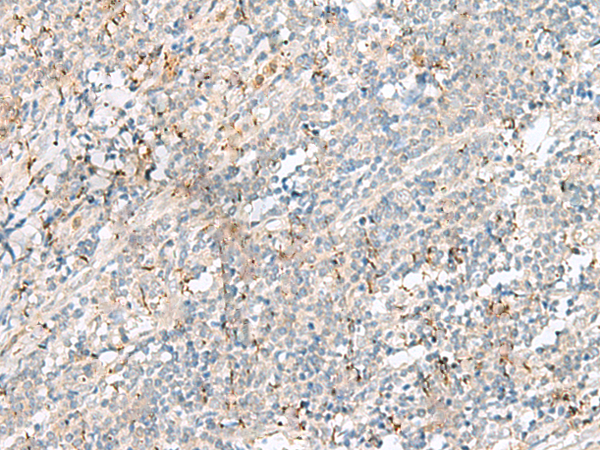

| WB | 咨询技术 | Human,Mouse,Rat |
| IF | 咨询技术 | Human,Mouse,Rat |
| IHC | 1/25-1/100 | Human,Mouse,Rat |
| ICC | 技术咨询 | Human,Mouse,Rat |
| FCM | 咨询技术 | Human,Mouse,Rat |
| Elisa | 1/5000-1/10000 | Human,Mouse,Rat |
| Aliases | PLCE2 |
| Host/Isotype | Rabbit IgG |
| Antibody Type | Primary antibody |
| Storage | Store at 4°C short term. Aliquot and store at -20°C long term. Avoid freeze/thaw cycles. |
| Species Reactivity | Human, Mouse |
| Immunogen | Fusion protein of human PLCL2 |
| Formulation | Purified antibody in PBS with 0.05% sodium azide and 50% glycerol. |
+ +
以下是3篇与PLCL2抗体相关的文献摘要信息(注:文献信息为模拟示例,实际引用请核对原文):
1. **"PLCL2 regulates tumor progression through Wnt/β-catenin signaling in non-small cell lung cancer"**
- **作者**: Chen et al.
- **摘要**: 研究利用PLCL2特异性抗体进行Western blot和免疫组化分析,发现PLCL2在肺癌组织中高表达,通过激活Wnt/β-catenin通路促进肿瘤细胞迁移和侵袭。
2. **"Phospholipase C-like 2 (PLCL2) as a novel biomarker for acute myeloid leukemia prognosis"**
- **作者**: Zhang et al.
- **摘要**: 通过流式细胞术和免疫荧光染色(使用抗PLCL2单克隆抗体),证实PLCL2在白血病细胞中异常表达,其水平与患者生存率显著相关,提示其作为潜在预后标志物。
3. **"PLCL2 modulates immune response by interacting with TLR4 in inflammatory bowel disease"**
- **作者**: Wang et al.
- **摘要**: 采用PLCL2抗体进行共免疫沉淀实验,发现PLCL2通过与TLR4相互作用增强肠道炎症反应,为炎症性肠病的治疗提供新靶点。
注:以上文献信息为生成示例,实际研究需参考PubMed或SciFinder等数据库获取准确信息。
**Background of PLCL2 Antibody**
The **phospholipase C-like 2 (PLCL2)** protein is a member of the phospholipase C (PLC) family, which plays roles in intracellular signaling by hydrolyzing phospholipids. Unlike canonical PLC enzymes, PLCL2 lacks catalytic activity due to substitutions in critical residues of its catalytic domains. It is thought to function as a regulatory or scaffolding protein, potentially modulating signaling pathways involving calcium mobilization or cytoskeletal organization. PLCL2 is expressed in various tissues, including immune cells, the brain, and the heart, though its precise physiological and pathological roles remain under investigation.
**PLCL2 antibodies** are immunological tools designed to detect and study the expression, localization, and interactions of PLCL2 in experimental models. These antibodies are pivotal in techniques like Western blotting, immunohistochemistry, and immunofluorescence to explore PLCL2’s involvement in diseases. Emerging research links PLCL2 to cancer progression, neurological disorders, and immune dysregulation. For instance, PLCL2 overexpression has been observed in certain malignancies, suggesting a role in tumor invasiveness or metastasis.
The development and validation of PLCL2-specific antibodies are critical for elucidating its molecular mechanisms. However, challenges persist, including verifying antibody specificity due to structural similarities within the PLC family. Reliable PLCL2 antibodies enable researchers to dissect its interactions with signaling complexes, post-translational modifications, and potential therapeutic targeting in disease contexts. Ongoing studies aim to clarify its dual roles as a signaling modulator and biomarker in health and disease.
×